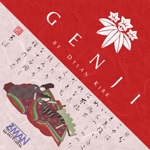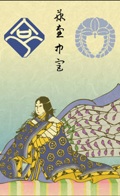by Demian Katz
 Genji
Genji
Published by Z-Man Games
Designed by Dylan Kirk
Layout by Alex Vasilakos
82 poem cards, 6 bonus cards, 12 princess cards, 4 season cards, 3 fashion cards, 6 pawns, 6 sets containing 15 livery tokens and one home marker, rules in three languages (English, French, Japanese)
2-6 players
$20
There was a time when most games were either completely abstract or
revolved around some combination of fighting, racing and making money.
The rise of the Eurogame has changed all that, though, mixing
abstract-like mechanics with a seemingly limitless range of subjects.
Genji falls into this newer mold: it's an enjoyably strategic
pattern-matching game wrapped in a distinctive Japanese-flavored theme
involving wooing princesses with love poetry. I can't say that I've
heard that one before...
Setup
The game's "board" is a circular layout of cards representing
princesses. At the center of the circle, additional cards show the
current season and its flower along with the fashion of the day. Each
princess also happens to have a favorite season and fashion, and each
player must choose a favorite princess to use as a home base. Players
are dealt a hand of cards showing portions of poems - either the first
three lines or the last two lines. Every poem card features symbols
(sometimes repeated) indicating the season, flower and/or fashion it
best represents.
Gameplay
Genji takes place over four rounds, each representing a different
season. The current fashion is randomized each season. Players move
around the circle of princesses, wooing them by playing poem cards. The
beauty of a poem is determined by counting how many symbols on the poem
cards match symbols on the target princess and/or the season and fashion
cards. Playing any poem, even an incomplete one, is enough to win the
favor of a princess who has not yet been wooed. However, players can
steal away a princess' favor by completing a partial poem or composing a
work more beautiful than the current favorite. A single player can also
defend a princess by writing multiple poems of increasing beauty - such
a group of poems stacks up and can only be defeated by an equally long
series of counter-poems.
 Each season ends and scoring takes place whenever a player loops the
board and returns home. There are three ways to score points: by
writing the most beautiful poem of the season; by successfully wooing
another player's "home" princess; or by having the favor of the most
princesses. Poems that contribute to the first two scoring conditions
are removed from the game as soon as they are scored, so they do not
apply when determining the "most princesses" condition; this offers
several different possible strategies for players to pursue during each
round.
Each season ends and scoring takes place whenever a player loops the
board and returns home. There are three ways to score points: by
writing the most beautiful poem of the season; by successfully wooing
another player's "home" princess; or by having the favor of the most
princesses. Poems that contribute to the first two scoring conditions
are removed from the game as soon as they are scored, so they do not
apply when determining the "most princesses" condition; this offers
several different possible strategies for players to pursue during each
round.
Scoring strategy is not the only place where players are free to make
decisions. Movement is diceless and requires a certain amount of
planning. On the first move of each season, a player must commit to a
particular direction (clockwise or counter-clockwise). On every move,
the player must choose how far to move (one to three spaces), trying to
land on the right princesses while timing the end of the season
advantageously. Playing cards, while superficially just about matching
symbols, still requires some strategy. Players must constantly balance
strengthening their positions with directly challenging their opponents,
occasionally taking time out from wooing to "study" and replace bad
cards in their hands. It can also help to think beyond the current
season, since the values of poems shift significantly with changes of
season and fashion; an insignificant poem introduced one season could
easily become most beautiful next season with a bit of planning or a
lucky gamble. The game certainly isn't a brain-burner, but there's
almost always something to think about in any given turn.
Presentation
 In recent years, Z-Man Games has been putting out increasingly
high-quality products, and for the most part, Genji lives up to
these standards. The cards are sturdy and coated, the artwork conveys
plenty of Japanese flavor, the pawns are nice solid wood, and the
full-color instruction manual is attractively presented. The only
components I was unhappy with were the cardboard counters, which have a
layer of plastic lamination that prevented them from punching out
easily; some tokens ended up peeling unattractively as a result of the
punching process. I'm a little concerned that the coating on the cards
may suffer a similar fate after heavy use, but so far they're still
intact. Flaws aside, the quality is pretty good for the money; it's not
quite up to Rio Grande standards, but it feels sturdier than much of
what Mayfair puts out.
In recent years, Z-Man Games has been putting out increasingly
high-quality products, and for the most part, Genji lives up to
these standards. The cards are sturdy and coated, the artwork conveys
plenty of Japanese flavor, the pawns are nice solid wood, and the
full-color instruction manual is attractively presented. The only
components I was unhappy with were the cardboard counters, which have a
layer of plastic lamination that prevented them from punching out
easily; some tokens ended up peeling unattractively as a result of the
punching process. I'm a little concerned that the coating on the cards
may suffer a similar fate after heavy use, but so far they're still
intact. Flaws aside, the quality is pretty good for the money; it's not
quite up to Rio Grande standards, but it feels sturdier than much of
what Mayfair puts out.
Theme
Theme can be a touchy subject with Euro-style games. Some players like
the addition of flavor on top of an essentially abstract game; others
get cranky about "pasted-on themes." Genji could certainly stir
up such debates. The game's presentation does a pretty good job of
evoking its theme... in a very abstract way. Players who actually want to
play a game that somehow involves writing poetry will be disappointed.
This is a symbol-matching game. During the course of symbol-matching,
halves of poems get put together, but this process does not involve
literary creativity, and it rarely results in coherent text. That's not
really a flaw in the game, but it's important to set your expectations
accordingly.
Conclusions
Genji packages a solid strategy card game in a distinctive
presentation and is a promising debut for designer Dylan Kirk. Some
players will appreciate this more than others, but if you're drawn to
the design or like the sound of a matching game full of planning and
player interaction, it's definitely worth a look. For my part, this is
far from being my new favorite game, but I expect that it will hit the
game table again in the future.
| Related reviews on OgreCave: |
|
|


 Genji
Genji Each season ends and scoring takes place whenever a player loops the
board and returns home. There are three ways to score points: by
writing the most beautiful poem of the season; by successfully wooing
another player's "home" princess; or by having the favor of the most
princesses. Poems that contribute to the first two scoring conditions
are removed from the game as soon as they are scored, so they do not
apply when determining the "most princesses" condition; this offers
several different possible strategies for players to pursue during each
round.
Each season ends and scoring takes place whenever a player loops the
board and returns home. There are three ways to score points: by
writing the most beautiful poem of the season; by successfully wooing
another player's "home" princess; or by having the favor of the most
princesses. Poems that contribute to the first two scoring conditions
are removed from the game as soon as they are scored, so they do not
apply when determining the "most princesses" condition; this offers
several different possible strategies for players to pursue during each
round.
 In recent years, Z-Man Games has been putting out increasingly
high-quality products, and for the most part, Genji lives up to
these standards. The cards are sturdy and coated, the artwork conveys
plenty of Japanese flavor, the pawns are nice solid wood, and the
full-color instruction manual is attractively presented. The only
components I was unhappy with were the cardboard counters, which have a
layer of plastic lamination that prevented them from punching out
easily; some tokens ended up peeling unattractively as a result of the
punching process. I'm a little concerned that the coating on the cards
may suffer a similar fate after heavy use, but so far they're still
intact. Flaws aside, the quality is pretty good for the money; it's not
quite up to Rio Grande standards, but it feels sturdier than much of
what Mayfair puts out.
In recent years, Z-Man Games has been putting out increasingly
high-quality products, and for the most part, Genji lives up to
these standards. The cards are sturdy and coated, the artwork conveys
plenty of Japanese flavor, the pawns are nice solid wood, and the
full-color instruction manual is attractively presented. The only
components I was unhappy with were the cardboard counters, which have a
layer of plastic lamination that prevented them from punching out
easily; some tokens ended up peeling unattractively as a result of the
punching process. I'm a little concerned that the coating on the cards
may suffer a similar fate after heavy use, but so far they're still
intact. Flaws aside, the quality is pretty good for the money; it's not
quite up to Rio Grande standards, but it feels sturdier than much of
what Mayfair puts out.